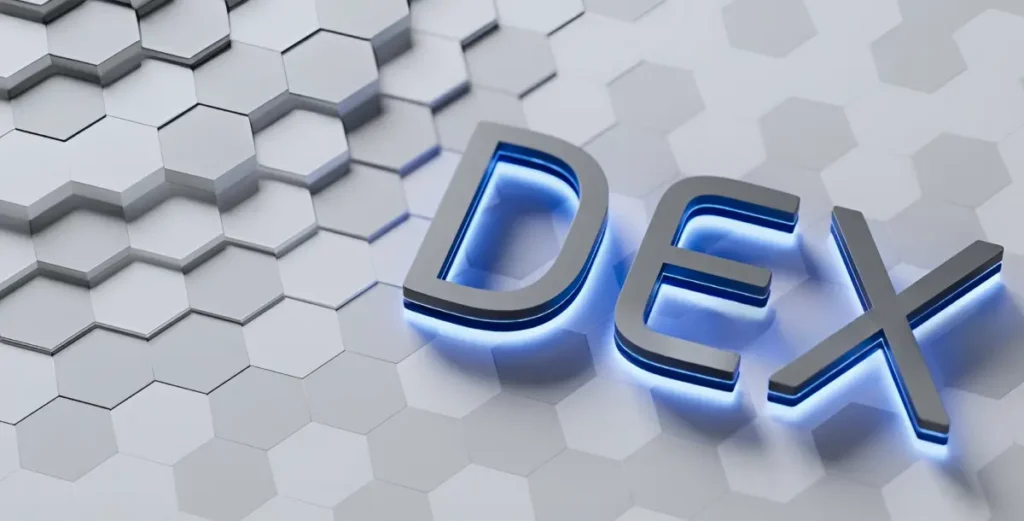Why Decentralized Exchanges (DEXs) Matter for Businesses
Enterprises and financial institutions are increasingly exploring decentralized exchanges (DEXs) as part of their trading and liquidity strategies. The rise of decentralized finance (DeFi) has demonstrated that DEXs can provide greater security, cost efficiencies, and regulatory resilience compared to traditional centralized exchanges (CEXs).
However, scaling DEX adoption requires navigating key challenges, including liquidity management, regulatory uncertainty, and security risks. Businesses that successfully integrate DEX infrastructure stand to reduce operational costs, minimize counterparty risks, and gain access to a rapidly growing market.
Market Insight: The decentralized exchange market is projected to grow at a CAGR of 36% between 2023 and 2030, with institutional adoption increasing by 250% in the last two years (Source: Messari, 2023).
This guide explores the business case for DEX adoption, comparing it to CEX platforms and outlining how enterprises can leverage both models strategically for long-term growth.
But what does this mean for you or your business?
If you’re a trader, using a decentralized exchange (DEX) offers direct custody of assets, placing control firmly in your hands. This eliminates the risk of losing funds due to a CEX being hacked or going insolvent. While fees can vary, many DEXs offer competitive rates, and the transparent nature of on-chain transactions allows traders to clearly see the costs involved. DEXs also enhance transparency, as transactions are often publicly verifiable on the blockchain, fostering trust and accountability.
For businesses, launching a DEX opens up new revenue opportunities. Direct revenue generation through trading fees and liquidity provision becomes possible, creating potential for a more self-sufficient financial ecosystem. Listing tokens on a DEX can provide broader market access, reaching a wider range of potential investors. While building a successful DEX requires significant technical expertise, community engagement, and navigating the evolving regulatory landscape, the potential rewards can be substantial. DEXs can offer cost efficiencies in certain areas by reducing reliance on intermediaries. Furthermore, a well-designed DEX can enhance security by distributing risk and reducing single points of failure.
DEXs address some key challenges in traditional trading, offering a compelling alternative for certain use cases. While they are not a one-size-fits-all solution, they represent a significant innovation in the financial landscape.
In this guide, we’ll dive deep into what DEXs are, and how they solve key challenges in trading, which make them faster, cheaper, and more reliable.
Why Are DEXs a Game-Changer?
Traditional trading platforms come with challenges such as centralized points of failure, the potential for high fees, and varying degrees of transparency. This is where decentralized exchanges (DEXs) disrupt the norm, directly addressing some of these concerns. They empower users with greater control over their assets and offer the potential for more transparent and efficient trading. By enabling peer-to-peer trading, DEXs cut out centralized intermediaries, fostering a more direct connection between buyers and sellers. Let’s dive deeper into how DEXs solve these key pain points for traders and businesses alike.
Key Differences CEX VS DEX Platforms
1. Security Risks
Centralized exchanges (CEXs) typically require users to deposit funds into their platform, creating a centralized system for asset management. While many CEXs implement robust security measures, the centralized nature can make them attractive targets for cyberattacks.
However, Decentralized exchanges (DEXs) operate differently by allowing users to retain full custody of their funds. With DEXs, assets remain in the user’s wallet, providing an added layer of control and reducing reliance on third parties. This decentralized structure minimizes risks tied to single points of failure, offering an inherently more resilient framework.
2. Fees
Centralized platforms often use intermediaries to facilitate trades, which can result in higher fees for users, often fit for institutional traders and businesses handling large transaction volumes.
By cutting out intermediaries through a peer-to-peer model, DEXs can offer lower fees. However, network congestion on the underlying blockchain can also significantly impact transaction costs on DEXs. Layer-2 scaling solutions like Arbitrum and Optimism aim to address these issues by processing transactions off the main blockchain, potentially leading to faster finality and lower costs.
3. Transparency
CEXs manage trades and fund flows internally, which may limit user visibility into the underlying processes. While many centralized platforms are making strides to enhance transparency, they don’t always provide full visibility into trade execution and fund management.
Whereas, DEXs are built on blockchain technology, where every transaction is recorded and publicly verifiable. This level of transparency builds trust and fosters accountability.
4. Transaction Speed During High Demand
Both centralized exchanges (CEXs) and decentralized exchanges (DEXs) can experience transaction delays during periods of high market activity. For CEXs, this can be due to internal system overload. For DEXs, particularly those built on popular blockchains like Ethereum, network congestion (high gas fees and slow transaction confirmation times) is a significant challenge.
How Layer 2 Solutions Step In:
This is where Arbitrum and Optimism shine. These Layer 2 scaling solutions offload transaction processing from the Ethereum mainnet, enabling faster finality and lower costs—even during high network activity.
Businesses are increasingly interested in starting decentralized exchanges (DEXs) due to several key advantages:
Custody and Control: DEXs operate on distributed ledgers, eliminating single points of failure and reducing vulnerability to attacks. This allows businesses to maintain control over their funds and assets, minimizing exposure to potential hacks or shutdowns.
Cost-Effectiveness: DEXs typically offer lower trading fees compared to centralized exchanges, resulting in substantial cost savings for businesses engaging in frequent trading activities. However, DEX fees are highly variable and often dependent on network congestion (gas fees).
Increased Transparency and Auditability: Transactions on DEXs are publicly viewable on the blockchain, fostering greater transparency and trust. This transparency can help businesses build credibility and demonstrate their commitment to fair practices.
Innovation and Flexibility: The open-source nature of DEX protocols allows businesses to develop custom solutions tailored to their specific needs. This flexibility enables rapid adaptation to evolving market trends and integration with existing business systems.
DEXs vs. CEXs: A Quick Comparison
Now that we’ve highlighted the benefits of DEXs and the innovations brought by Arbitrum and Optimism, let’s compare them directly to centralized exchanges (CEXs):
Real-World Examples of Decentralized Exchanges (DEX)
After discussing the core benefits of decentralized exchanges (DEXs), let’s dive into some real-world examples that demonstrate the power of DEXs in the crypto ecosystem.
- Uniswap
Overview: Uniswap is one of the most popular decentralized exchanges, operating on the Ethereum blockchain. It employs an Automated Market Maker (AMM) model, allowing users to trade tokens directly from their wallets via liquidity pools—eliminating the need for traditional order books.
Why It’s Popular:
- User-friendly interface
- Extensive token support
- High liquidity on Ethereum blockchain
- Built on Ethereum, ensuring top-tier security and trust.
Key Features: Token swapping, liquidity pools, Ethereum integration
- PancakeSwap
Overview: PancakeSwap is a leading DEX operating on the BNB Chain (formerly Binance Smart Chain) . Known for its low fees and fast transactions, it utilizes AMM model similar to Uniswap but focuses on making decentralized finance (DeFi) accessible to everyday users by leveraging the efficiency of BNB Chain.
Why It’s Popular:
- Low transaction fees
- Broad token variety, including Binance Smart Chain-based assets
- Yield farming and staking opportunities for passive income
- Gamified elements, such as lotteries and prediction markets.
- Key Features: Token swapping, liquidity pools, yield farming and staking, Binance Smart Chain integration.
- dYdX
Overview: dYdX is a decentralized exchange focused on advanced trading capabilities, such as margin trading and perpetual contracts. It initially operated on Ethereum but has transitioned to a Layer 2 solution to address scalability and cost issues. dYdX appeals to professional and institutional traders seeking a decentralized yet feature-rich platform.
Why It’s Popular:
- Advance trading tools, including leverage and deliveries
- Integration with Layer 2 solutions for reduced gas fees
- High liquidity for margin and perpetual trading pairs
- Trusted by experienced traders for decentralized derivatives trading
- Key Features: Margin trading, perpetual contracts, Layer 2 scalability, advanced order types and professional-grade interface
- Hyperliquid
Overview: Hyperliquid is a high-performance decentralized exchange tailored for professional traders. It prioritizes speed, scalability, and an intuitive user experience by leveraging advanced blockchain technology, including custom-built solutions to handle high-frequency trading.
Why It’s Popular:
- Blast-fast trade execution for high-frequency traders.
- Minimal slippage due to liquidity pools
- Supports advanced order types, making it ideal for institutional users
- Strong focus on security and scalability
- Key Features: High-frequency trading support, custom blockchain scalability solutions, deep liquidity pools, advanced order types
Adopting DEXs for Sustainable Trading Success
Decentralized exchanges (DEXs) are emerging as a significant force in the evolving financial landscape, offering potential benefits in terms of transparency, custody, and access.
For businesses, operating a DEX can unlock new revenue streams through trading fees, liquidity incentives, and token listings. Running a DEX provides businesses with greater control over market infrastructure, and facilitates access to a broader range of tokens and markets, particularly within the burgeoning DeFi space. Launching a successful DEX can further enhance brand reputation and position a business as an innovator.
As the DeFi sector continues to grow, understanding DEX functionality and integrating it into business strategies will be crucial for maintaining a competitive edge. For both individual traders and financial institutions, DEXs present an opportunity to enhance profitability, expand market reach, and future-proof operations in the decentralized economy.
Ready to Experience the Benefits of Decentralized Exchanges?
Take the first step toward decentralized trading? Explore how your business can harness the potential benefits of DEX with a personalized demo.
Contact Us to learn how we can tailor decentralized finance solutions to your business.
Recap: Why Decentralized Exchanges Are a Must for Your Business
- Potentially Lower Costs: Reduce fees with efficient Layer 2 technology.
- Custody and Control: Keep your funds under your control.
- Future-Proofing: Stay ahead in a rapidly changing financial ecosystem.
At ChainUp, we specialize in helping businesses seamlessly integrate decentralized exchanges into their operations. Don’t let your business fall behind—schedule a consultation today and see how DEXs can unlock new growth opportunities.
The future of trading is here. Are you ready to take the leap?




